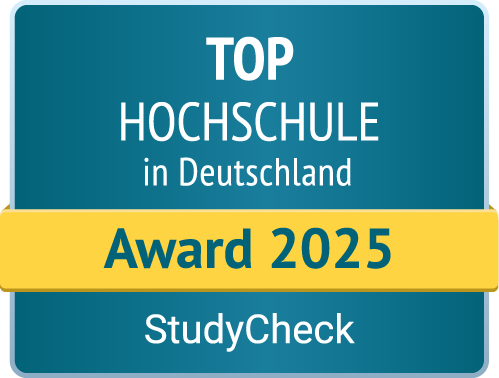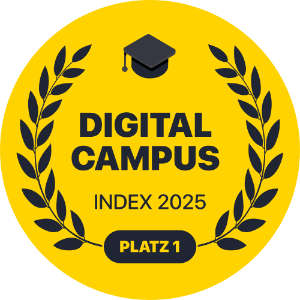Faculty of Engineering
Sustainable Engineering (NIW)

Study overview
As a versatile sustainability engineer, would you like to take on the challenge of reconciling our highly technological society with the demands of an intact environment, help shape technological change in practice and become involved in research and development?
Then you will lay exactly the right foundations with the "Sustainable Engineering Sciences" degree programme! We offer you the opportunity to mature into a sustainability engineer in 7 semesters in one of two fields of study. You decide which field of study you want to pursue.
You make the final decision for your field of study at the end of the third semester. This means that the first three semesters offer you enough time to get your bearings and to "get a taste" of the fields of study on offer.
| Short form | NIW |
| Type of study | Full time |
| Standard period of study | 7 semesters |
| Degree | Bachelor of Engineering (B.Eng.) |
| Start of studies | Winter semester |
| Admission restrictions | none |
| Lecture location | Ansbach |
| Language of instruction | German |
| Course management | Prof. Dr.-Ing. Michael Walter & Prof. Dr. Tim Pidun |
| Student advisory service | Prof. Dr.-Ing. Georg Rosenbauer |
| Student Services | studierendenservice.aiw(at)hs-ansbach.de |
Fields of study

Energy and Building Technology (EGT)
In "energy and building technology", you will deal with the sustainable generation, consumption and distribution of energy. In the field of building technology, you will learn about two central components of sustainable building technology: building construction and the technical equipment of buildings
Production and Plastics Technology (PKT)
In "production and plastics technology", you will learn about the most significant aspects of industrial production. A special focus is placed on the application in the plastics industry. The material-specific issues concerning polymers and their production play an important role.
Study structure
Your bachelor's degree program comprises seven semesters. In the first three semesters, you will learn about important engineering fundamentals and gain an overview of the many aspects of sustainability. At the beginning of the fourth semester, you will decide on your field of study and specialize in it from then on.
Within your field of study, we offer you the opportunity to individually select subjects and topics that you consider relevant to you. During the sixth semester, the practical study semester, you will gain your first practical experience as a future sustainability engineer in a company.
In the last semester, you will complete your bachelor's thesis and deepen your knowledge of sustainably designed products and processes. Throughout your studies, the sustainability goals will accompany you as an integrative element of various modules.

In June 2021, the Bachelor's degree programme in Sustainable Engineering was successfully accredited. The qualified study programme was awarded the quality seal of the Accreditation Council by the ACQUIN agency. The accreditation proves the high level of the study programme and documents the international comparability of the degree.
Application and start of studies
Are you interested? Then apply here for our Applied Engineering (AIW) degree programme.
During the online application, you can already specify a desired field of study - don't worry, your choice isn’t definitive. You will make your final decision for the area of study at the end of the third semester. Thus, the first three semesters offer you enough time to get oriented as well as to discover the fields of study that are interesting for you.
The application period is from May 2nd to September 30th. The studies start in the winter semester on October 1st.
If you have any questions, please contact the Student Services.
studierendenservice.niw(at)hs-ansbach.de
Note for transfer students
Students who change their course of study can enter a higher subject semester. This is possible for the winter semester as well as for the summer semester.
Previous achievements that have a subject related equivalent in the Applied Engineering Science Programme can be recognized.
To do so, compare the module handbook of your previous degree programme with that of the Applied Engineering Sciences Program. If you have subjects from higher semesters recognized, you will determine your field of study at the same time. Invest the time to read the module manuals, because it is your achievements that you can have recognized for your new degree program! Please note the general information for university and program transfer students.
Continuing with graduate studies
Ansbach University of Applied Sciences offers you various master's degree programmes that you can take following your bachelor's degree:
Including training to become a recognised energy efficiency expert (according to dena standard)
We offer you the opportunity to complete the training to become an energy efficiency expert (previously known as an energy consultant) through the clever choice of modules in the course of your NIW studies. This training is established and recognised throughout Germany and follows the strict requirements and standards of the German Energy Agency (dena).
Among other things, you have to take selected modules from NIW, which of course also count towards your NIW degree. We then round off the training with individual content and a project. You will receive all further details in the first semester of your NIW studies or directly from us.
If you want to know more about becoming an energy efficiency expert, then take a look here.
Campuses
In addition to the main campus in Ansbach, Ansbach University of Applied Sciences has other locations where courses in Applied Engineering take place.

Campus Feuchtwangen
At the Technology and Research Center Feuchtwangen of the Ansbach University of Applied Sciences, modules from the branch "building technology" are offered within the Sustainable Engineering Sciences.
More Information
Campus Weißenburg
At the kunststoffcampus bayern in Weißenburg of the Ansbach University of Applied Sciences, modules from the branch "plastics technology" are offered within the Sustainable Engineering Sciences.
Further Information
The diversity of the degree program is reflected in the career prospects. Employers particularly appreciate the broad basic knowledge and practical skills of our graduates. Combined with the specialization in the main course of study, many occupational fields open up in the engineering sector.
Occupational fields
The study of applied engineering optimally prepares you for your professional life. Depending on the orientation of your studies, you can work in a variety of companies and research institutions in a wide range of industries. Thus, you will find your challenges in the following industries:
- Plant and Mechanical Engineering
- Automation and Electrical Industry
- Consulting
- Energy Supply Companies
- Engineering Offices
- Chemical and Industrial Production Plants
- Public Utilities
- Technical services in public authorities, in companies in the biotechnology and environmental technology sectors and in information and communication technology
On the one hand, you will be able to apply a lot of skills learnt during the practical semester. On the other hand, you will discover how important it is to be able to familiarize yourself with new tasks independently.
According to the choice of your field of study, you will look for an internship on your own responsibility (you can find information on administrative details here). The fields of activity during the internship semester are as diverse as the professional possibilities.
Here you will quickly take on project responsibility and be directly involved in day-to-day business. For many, the internship semester also opens the door to a later job.


Semester abroad
When planning and carrying out a semester abroad, you will receive individual support from our International Office – both organizationally and, in many cases, financially. To make the start easier, you can prepare your stay abroad in our Language Centrum.

Ansbach International Summer School
International encounters are also possible on the Ansbach campus. Students from all continents travel to the Ansbach International Summerschool. German-international teams work together in various specialist workshops. In addition to the technical learning content and the intercultural training, encounters and fun are not neglected. The relevant Summer School workshops are credited as a general science elective module in the NIW degree programme.
© 2025 Hochschule Ansbach






